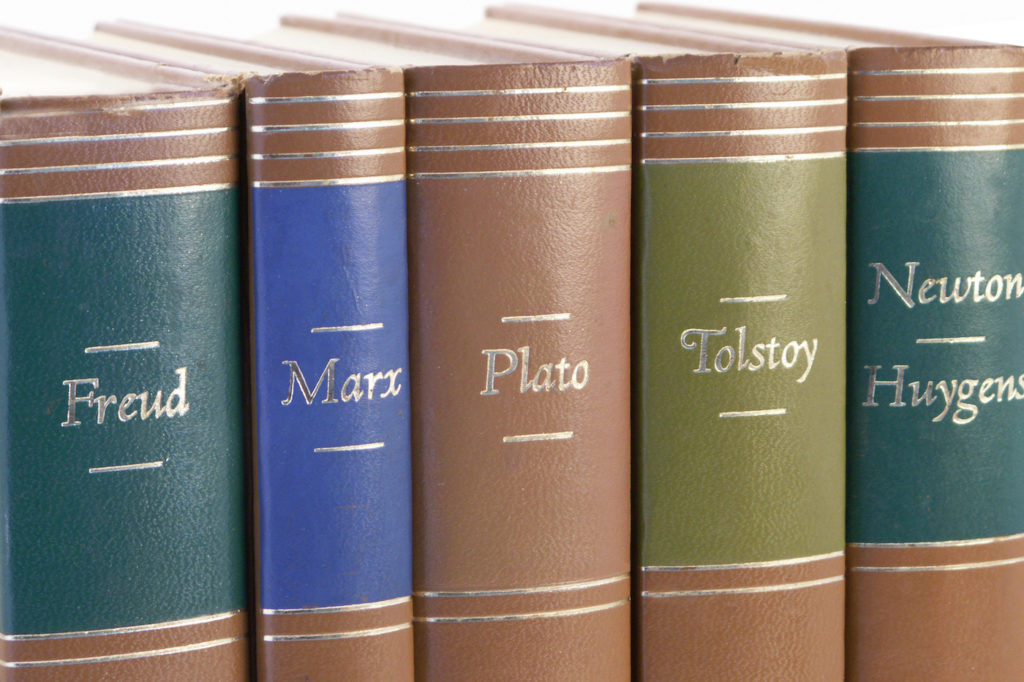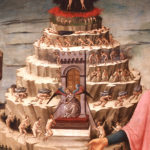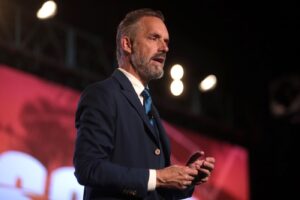With Rescuing Socrates: How the Great Books Changed My Life and Why They Matter for a New Generation, Columbia University professor Roosevelt Montás has achieved something very few are able to do today: draw support across the political spectrum. Since its release last fall, the book has been praised by conservative outlets, heterodox writers at The New York Times and The Atlantic, and even the leading socialist magazine in the U.S. This is, to put it mildly, a rare feat in our polarized era.
Yet Rescuing Socrates isn’t primarily about politics per se, but about liberal education. It urges universities to reimagine themselves less as training grounds for future professionals or academics, and more as spaces where the intellect and character of students are formed. It argues that the Great Books of the Western canon—works of literature, history, philosophy, and more that have shaped students up and down the centuries, including Montás himself—are especially instrumental in this regard.
It’s also a deeply personal book. Montás recounts his own story, the story of how a first-generation immigrant from the Dominican Republic went from not knowing a word of English to becoming an Ivy League humanities professor in charge of the nation’s oldest Great Books program. His education shaped his identity, but in a more substantive way than our discourse typically imagines.
So while the book is not primarily political, it does raise essential questions about two increasingly politicized topics: universities and identity. But it’s in part because of this politicization that Rescuing Socrates is especially instructive. Montás offers an account of the university that’s critical without being despairing, and a way of talking about identity that’s sensitive without being reductive. It’s a difficult balance to strike, and our inability to do so leaves many looking at our campus culture wars and judging things to be beyond repair. But whereas many today see an irreversible crisis in higher education, Montás sees fertile ground for renewal.
Start your day with Public Discourse
Sign up and get our daily essays sent straight to your inbox.A Crisis of Consensus
He isn’t, however, oblivious to the challenges that universities face. Our culture increasingly treats college in transactional terms. (What sort of job will this major land me?) Students have flocked to STEM and pre-professional majors, while enrollment in the humanities has dropped. Academics in the humanities and social sciences are quick to “[wag] the finger of social justice,” in Montás’s words. Today’s academic debate, “doesn’t just illuminate, it burns; it doesn’t just judge, it condemns; it doesn’t just reject, it cancels.”
For Montás, these two problems—disengaged students and irascible academics—share a cause. Although it’s important to note the cutting-edge research coming out of universities, which Montás acknowledges, they have also abdicated a sort of responsibility to form students, particularly undergraduates through a general education. They hesitate to assert that particular texts or authors are more deserving of students’ attention, settling instead on “competencies rather than on knowledge and on ways of knowing rather than on things to be known.” They thus forgo decisions about the content of their general education, resulting in a “crisis of consensus” about what’s most worth teaching students.
What should that content be? Montás has a clear suggestion: the Great Books. Much of Rescuing Socrates explores Montás’s experience with this educational model, both as a student in and later as a professor and administrator of Columbia University’s Core Curriculum. Founded in 1919 under the name “General Honors,” the program exposed a small group of students to one classic work of Western civilization a week, beginning with The Iliad and continuing to modernity. In 1937, the sequence became required for all first-year undergraduates.
A Great Books curriculum focused on the perennial questions provides a common experience for all students.
Unlike today’s hyper-specialized humanities, this sort of Great Books education isn’t concerned with “questions for academic journals.” Rather, it’s focused on admittedly broad questions that are nevertheless of perennial importance: about the human person, justice, friendship, love, God. A curriculum focused on these questions isn’t just more appealing and instructive; it also provides a common experience for all students, one that gives them “a shared vocabulary with which to describe [the world] and act upon it.”
But for Montás, the content of a liberal education matters less than its practice. The Great Books are pedagogically helpful not because of the answers they provide, but because of the questions they raise. They habituate students to consider and reconsider questions, even if their search doesn’t culminate in certitude. “This is the basic task of a liberal education,” writes Montás, “[not] to deliver truths, but to cultivate the life-altering disposition to look inward even as one looks outward.”
Needless to say, some disagree that this “inward turn” is liberal education’s ultimate goal. Cultural critic Mark Bauerlein wrote in 2008 that millennials have “contracted their horizons to themselves,” rather than opening themselves to the lessons of the past. More recently, in his otherwise largely positive review of Rescuing Socrates, George Will pithily wrote that, “Actually, [students] should not be encouraged to have more of what they spontaneously have—a high ratio of interest in themselves to their interest in more substantive things.”
Montás, however, doesn’t worry that his focus on the self will exacerbate a sense of conceit among young people, in part because of his own interactions with students as a professor. While we frequently characterize college students as hypersensitive and self-aggrandizing, Montás thinks differently:
Rather than the entitled and fragile “snowflakes” some observers have described, I find my classrooms populated with young people of real depth and earnestness who, like me at their age, are racked with existential anxiety and are struggling with the threat of meaninglessness. They are obsessed with moral questions and wonder whether the frantic pursuit of success, wealth, and status will actually satisfy their deepest thirst.
Montás’s discussions of both a Great Books education and the students he has taught leave the reader with a much different impression of higher education than we often encounter. Universities are not devoid of dysfunctions, certainly. But those dysfunctions don’t overcome Montás’s sense of hope, both in the educational potential of a Great Books liberal education and in students’ receptiveness toward them.
Identity and Representation
This hope extends to a potential tension between a robust Great Books education and some of the most hot-button issues on campuses today: questions about identity and representation.
The idea that the Great Books encourage a shared, even inclusive, curricular experience runs against popular complaints against them. They’re too male, too Eurocentric, too unrepresentative of a diverse student body, critics say. Activists at Columbia, for example, organized a forum criticizing the Core, with one student objecting to “looking at history through the lens of these powerful, white men.” English faculty and students at Yale pushed to “decolonize” its major requirements, ultimately succeeding in changing its required courses.
The Great Books offer us the opportunity to expand our moral imaginations, leading us to consider less obvious aspects of who we are.
Montás isn’t categorically against calls to diversify curricula. He acknowledges the claim that Great Books programs are predominantly unrepresentative, even if they aren’t exclusively so (as anyone who reads Wollstonecraft or Du Bois in a Great Books program will tell you). He supports focusing later parts of the curriculum on questions of gender and race, when more women and minority authors were writing about those topics.
Nevertheless, Montás argues that criticizing the Great Books for being unrepresentative is actually less inclusive than it appears. Why? Because it assumes “too narrow a conception of what sorts of identities our students bring with them and what aspects of it we should affirm.”
Montás’s own liberal education illustrates this point. He arrived in New York City just before his twelfth birthday, experiencing many of the disorienting challenges that immigrants face, from language barriers to cultural distance from others. Yet by his own account, it was his liberal education, beginning with finding a collection of Socratic dialogues in high school, that helped him make sense of his own story.
What the Great Books offer racial minorities is the same thing they offer everyone: an opportunity to expand our moral imaginations, leading us to consider less obvious aspects of who we are. Montás and Plato were born thousands of years apart and belonged to different cultural, linguistic, and religious traditions. And yet, Montás confidently writes:
I found in Plato a genuine affirmation of my identity. It was not my identity as a Dominican immigrant that Socrates affirmed, but something more fundamental, an identity that cut me loose from the assumptions of my peers at Columbia as much as it did from the expectations of my Dominican community. . . . Here was a sort of identity that felt true to my deepest self.
In this regard, Rescuing Socrates is especially helpful, not just to educators, but for the broader public’s understanding of the role that identity plays in our lives. We often treat an education that doesn’t represent the identities of an increasingly diverse population as deficient or harmful. Alternatively, we think that those who worry about racial and ethnic representation are simply too myopic to appreciate the wisdom of the past.
An accurate representation of identity must account for our aspirations to discover truth, to actualize justice, and, yes, to understand ourselves.
Montás suggests a more nuanced disposition. He doesn’t dismiss concerns about representation. But he also insists that an accurate representation of someone’s identity must account not just for demographic characteristics, but also for our primordial human aspirations to discover truth, to actualize justice, and, yes, to understand ourselves. Figures like Plato, Augustine, or Gandhi may not share Montás’s cultural background, or ours. But through their explorations of these questions, they resonate with more important aspects of who he is, and who we are as well.
Reimagining Education
Rescuing Socrates was released during a period of heightened frustration with higher education. The American right in particular has shifted from poking fun at the impracticality of philosophy degrees to declaring that “universities are the enemy.” Survey data and high profile cases paint colleges as censorious and insular, and ongoing reports suggest many just aren’t exposing students to key aspects of the past—and sometimes to none at all.
In this context, there are probably some observers of American higher education, especially from the right, who will think Montás isn’t critical enough of universities. If higher education is fundamentally broken, imagining a renewal of liberal education at today’s universities might seem like an exercise in wishful thinking.
It’s certainly important to call out curricular shortcomings and partisanship at universities, and not to cower out of worry about pushback from the higher education establishment. Problems about viewpoint diversity and curricular priorities will not go away on their own, and self-censoring will only ensure that those who do speak up will have a much harder time making their case.
But by the same token, critics of the university must proceed with caution, not letting justified frustration morph into fatalism. This is in part out of a recognition that reflexive criticism can beget distrust and animosity that are ultimately counterproductive. It also risks downplaying the valuable contributions to liberal education made by various initiatives around the country, from Great Books programs to academic centers, to speaker series, to external partnerships—including at the Witherspoon Institute, which publishes Public Discourse.
More fundamentally, we need an account of what universities have the potential to become just as much as we need to recognize what they’re failing to be. In this regard, Rescuing Socrates is tremendously instructive. Montás doesn’t frame the book primarily around today’s campus culture wars, which quickly devolve into pessimism. Rather, he presents a vision of the potential of colleges as repositories of liberal education, pointing us toward a refreshing ideal of the university.
The result is a book that brims with hope. Readers should draw confidence from Rescuing Socrates, and particularly from its trust in the potential of a liberal education to form us, shape us, and ultimately draw us out of ourselves through engagement with the fundamental questions of human existence.














